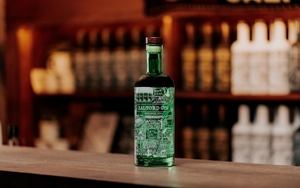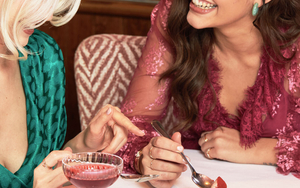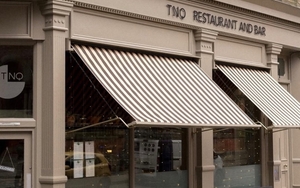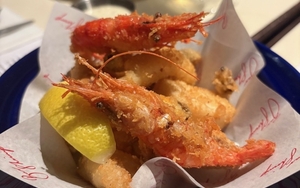CONFIDENTIAL managed to grab a word with Raymond Blanc while he was in Knutsford to launch the latest branch of his Brasserie Blanc French restaurant chain, which has opened in the historic Royal George building on Regent Street. The restaurant aims to serve affordable French food, preparing everything in-house using fresh seasonal ingredients, with a menu inspired by the kind of homely cuisine Maman Blanc used to make.
I've trained over 35 certified Michelin starred chefs... I have many sons and daughters
We got there early to have a look round, taking in the Grade II listed sweeping staircase, the antique cabinet of fine wines and the communal ‘kitchen table’ designed for larger informal gatherings. It didn’t take us long to wile our way into the kitchen to find ourselves being slipped raw gold medal winning oysters by group executive chef Clive Fretwell, but it was Monsieur Blanc we had come to see.
Raymond came to England in 1972 and got himself a job as a waiter at The Rose Revived in Oxfordshire. One day, the chef was unwell, so he worked in the kitchen and his fate was sealed. He claims it was books by Jane Grigson, Constance Spry and Elizabeth David which helped him improve his English.
He went on to purchase a rundown private manor house in Oxfordshire set in 30 acres, with his wife and a few shareholders (mostly friends) and set about transforming it into what is now the luxurious Le Manoir Aux Quat’Saisons. In its first year of opening it won Egon Ronay Restaurant of the Year, and various other accolades, followed by two Michelin stars, which it has held onto ever since.
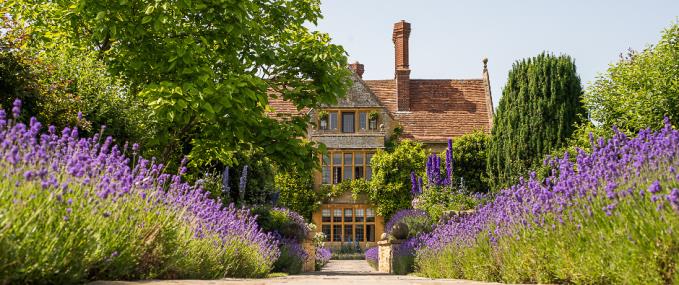 Le Manoir Aux Quat’Saisons
Le Manoir Aux Quat’SaisonsCountless chefs have come through his kitchens, going on to open successful establishments of their own, in turn mentoring for three or four generations of chefs. If we drew his culinary family tree on a huge Blanc canvas, we’d probably be able to prove that over one third of the UK's Michelin starred chefs have worked with Raymond at one time or another, including Marco Pierre White, Heston Blumenthal, Michael Caines and Paul Heatcote. Not bad for a self taught chef.
Raymond Blanc’s life has been well documented with facts, figures and dates. He has written many books and has appeared in countless television series over the years. So when you manage to score an interview with the man himself, not knowing whether you’ll be given five minutes or an hour, what do you ask him?
After the closure of the Manchester branch of Brasserie Blanc in 2010, would you consider opening another venue in the city?
RB: “Ah yes, we were very sad. It was in the wrong place on the end of King Street. Location is everything. We’ve not lost our appetite, we still have our eye on Manchester and also in Liverpool and we will open eventually when we get the right site.”
Do you ever sit back and imagine what the current state of British cuisine might be without you?
RB: “I have a lot of sons and a lot of daughters. I have trained over 35 certified Michelin starred chefs but not just them, there are world class sommeliers and craftsmen, gardeners, people mostly who love what they do, and passing on their knowledge. I will rejoice.”
Who do you get your work ethic from?
RB: “Both my parents. I come from a poor working-class, republican background. My papa answered De Gaulle’s post-war call to create families and produced five children" (it might have been more if his maman hadn’t threatened him with the pocket-sized guillotine.) "Papa built his own house, as in physically built it. Then he built an enormous garden."
Papa Blanc was subsequently instrumental in establishing the original garden at le Manoir, bringing seeds over from his native French village. The now well-established botanical gardens include 70 traditional and exotic varieties of cultivated herb, a two-acre vegetable garden producing over 90 types, a mushroom garden sprouting around twenty edible species, and an organic orchard bringing in beautiful apples, pears and quinces.
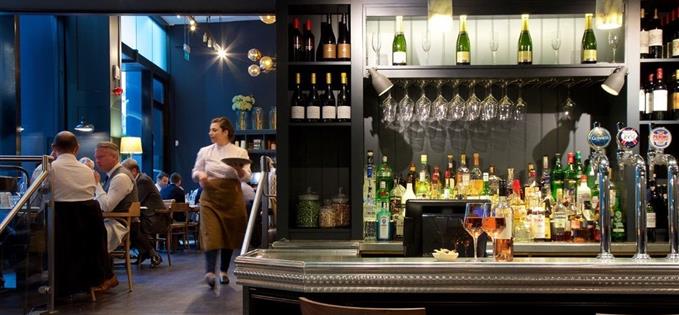 Brasserie Blanc
Brasserie BlancHow much work did it take to establish Le Manoir?
RB: “I fell in love with it but we had to redo the foundations, the roof, all the electrics and the plumbing. There was wet rot and dry rot everywhere and suddenly your dream transforms itself into a nightmare. There was no insulation, the pastry section was freezing.”
“I started the first kitchen with a few chefs, making my own bread. I was not a chef, I was not a banker and I was not a gardener but I loved gardens and could see the magic in this typical layered English garden with Oxford stone walls and Elizabethan chimneys beyond the entanglement of wild elder and overgrown sprouts hardened from several winters.
They added the sumptuous hotel in 1984 and a cookery school in 1991.
What was the state of British cuisine when you arrived?
RB: “Back then restaurants were exclusive, elitist, class-led. The doom, the rain, the bad food - all processed, all coming from intensive farming, or made in factories. British food culture was based on heavy suet puddings which took hours to steam and although the end result was delicious, a meal like that could take days to recover from. Food should be fresh and light.”
You’ve seen cooking styles evolve over the years. Technology is quite prominent in modern kitchens, but are we right to associate you with a more natural and classic approach?
RB: “Not really. I was the very first chef in the world to embrace molecular gastronomy and low temperature cooking. I did demonstrations to world-renowned professors on the power of yeast and fermentation. We experimented with emulsions, finding ways to make lighter sabayons and hollandaise sauces with less butter. I started to cook at 28 years of age, which is very late, I had the recipe history of my family and my own country passed on to me, but what I was missing was an understanding of the ‘de-naturation’ process of food. I bought all the food-science books which existed about separating proteins and carbohydrates though heat, books about colours, vitamins, nutrients, and I read them all, but I couldn’t understand them because they were written for scientists.
"I found a mentor during the annual Symposium of Food and Cookery at Oxford University. Biochemist Nicholas Kurti, spoke about food in a manner I never heard before, translating science into simple cookery processes. I did a book and a TV programme on it in 1996 (Raymond Blanc Mange) providing a scientific explanation for kitchen conundrums.
"Yet I refused to become their champion. It gets to a point where food cannot be separated into science without it being reduced to little more than fashion. I am still searching for new ideas. I keep my mind open constantly. Once you don’t do that you are a dead man."
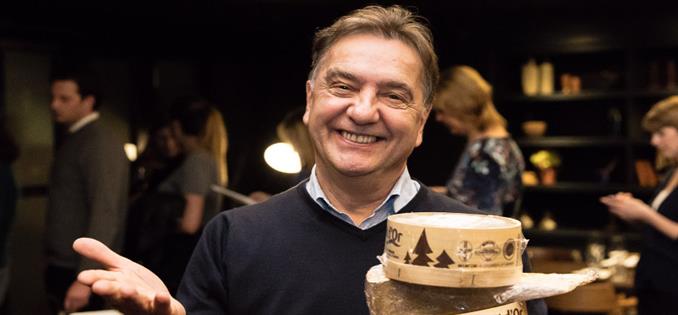 Raymond and some cheese
Raymond and some cheeseAre you happy with the current state of the British hospitality industry?
RB: "It’s been a privilege to have trained hundreds of young people who are now passing on a philosophy, a vision and are now, at last, making our wonderful l’hotelerie industry dignified, bringing back certain values which have been deeply missing. Mums and dads are now happy to bring their children to come into our business where training is a core value. Only a few years ago they were being put in front of terrible television programmes which would sensationalise violence. Ten million people watching others being vilified and humiliated in front of cameras thinking it was great. These people and these programmes have caused us deep harm.
"British chefs who lost their food culture are now reconnecting with all these values about respect for ingredients and provenance.
Apart from all the work you put into establishing Le Manoir, what made you stay in England?
RB: "I am 150% of a man, 100% Frenchman but the other 50% is about you. It’s about you having enriched me with your multi-cultural society, with your openness of ideas, your creativity, your global open outlook, your kindness, I love Great Britain. I know all about your magnitude, your ability to listen. The French listen at the same time as they speak, that’s why there are so many problems in France. You know how to queue, I think that’s a great republican value. We scramble all the time in France, you can laugh about yourselves which I think is a great, great quality. It took me 40 years to learn to laugh about myself and I still don’t know how. All of these things have made me a much bigger man. I have been enriched by your culture."
*blushes*
Here are four more facts about Raymond Blanc:
He is an absolute geek. He immerses himself in a subject until he understands it at a deep level; gardening, native plants, British food culture, culinary history of classical cuisine, food science. If he doesn’t know the answer, he’s not afraid to search for someone that does.
Many of his core staff have been with him for years. Executive chef Clive Fretwell started as a commis a couple of decades ago, as did Mark Peregrine who is now head tutor of the Raymond Blanc Cookery School.
He loves a rambling story but always returns to the original point. He drew every journalist an unintelligible diagram. Ours showed the development of food from Careme, L’Escoffier and Bocuse, through to Nouvelle Cuisine “which brought back seasonality, produce led dishes and lightness, until it was murdered by many chefs who didn’t have the skills. Putting turbot with raspberries doesn’t make you a genius, it makes you an arsehole” with much angry crossings out through fusion food “a disastrous murky mess of a stew of ideas with no respect” to present day molecular gastronomy and the Nordic movement “which makes chefs think again, to connect and return to the wilderness, purity, respecting and understanding terroir.”
He loves Jamie Oliver. Like really loves him. “I think Jamie should be a demi-god, certified with a statue in the middle of London. We have some amazing role models in Great Britain.”
And then our time was up. He was polite, attentive and the left lobe of his brain is still very much firing. He broke off to give a short inspirational speech to staff during their final briefing before the launch event began. He inspires loyalty and in turn is a very inspirational chap indeed. Viva le Blanc.
Brasserie Blanc, Royal George Building, Regent Street, Knutsford WA16 6GR











